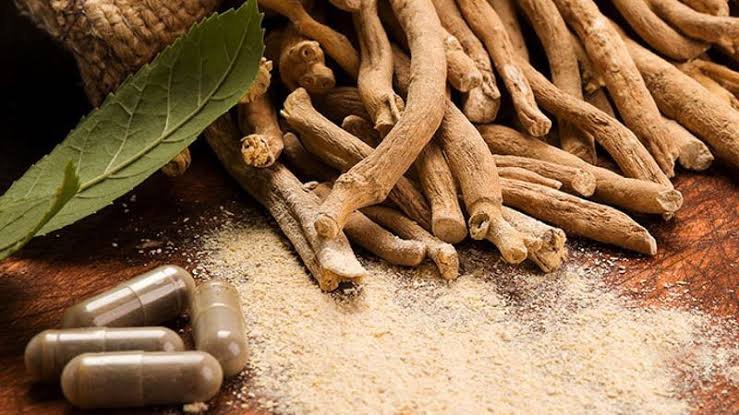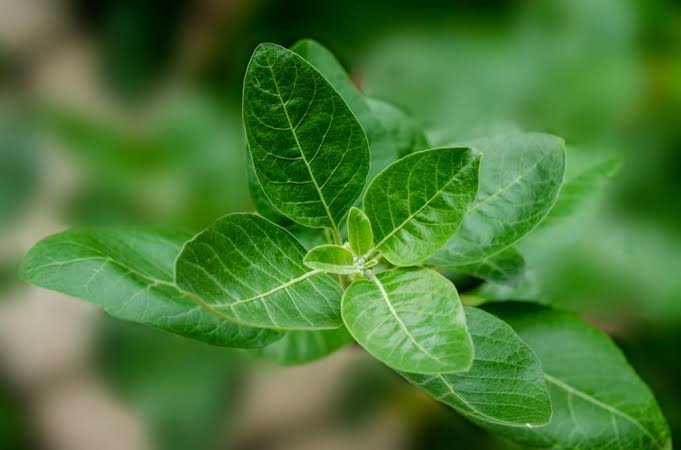As an influencer from Herbal Rejoice, a blog dedicated to promoting healthy living, I am thrilled to introduce you to Ashwagandha – a phenomenal herb known for its numerous benefits. This ancient Ayurvedic treasure, also referred to as Withania root, Asgandh, or Winter cherry, holds the key to unlocking vitality, rejuvenation, relieving stress, boosting the immune system and overall wellness. It is used for insomnia and anxiety. It also addresses fertility issues.
Botanical Marvel – Where Nature’s Goodness Resides
The biological source of Ashwagandha lies in the stem bases and dried roots of Withania somnifera (Linn.) Dunal, a member of the Solanaceae family. The herb thrives in various regions, including Pradesh, Punjab plains, Gujarat, Rajasthan, Congo, South Africa, Egypt, Morocco, Jordan, Pakistan, and Afghanistan.
Unveiling the Roots – A Macroscopic Marvel

Its roots boast a distinct appearance with a buff to grey-yellow outer colour, adorned with longitudinal wrinkles. They are unbranched, straight, and conical, bearing a crown with several bud scars. The taste of the roots is bitter, and their fresh aroma resembles that of horse urine, giving the herb its unique name, “ashwagandha.”
Exploring the Rich Chemistry of Ashwagandha
The power of Ashwagandha lies in its chemical constituents, notably alkaloids and steroidal lactones. Withanine takes the spotlight as the main alkaloid, accompanied by somniferine, somniferinine, withananine, pseudo-withanine, tropine, pseudo tropine, 3-a-gloyloxytropene choline, cuscohygrine, isopeletierine, anaferine, and anahydrine. Additionally, acyl steryl glucosides v, sitoindoside VII, and sitoindoside VIII are isolated from the roots.

Intriguingly, the leaves hold their therapeutic value in the form of steroidal lactones, commonly known as “withanolides.” These compounds feature C₂ steroidal nucleus with a C side chain, forming six-membered lactone rings. Studies have shown the presence of such compounds in plants from Israel, India, and South Africa.
Empowering the Body – The Science of Ashwagandha
Ashwagandha is hailed as an adaptogen, aiding the body in mitigating the adverse effects of stress. Its antioxidant activity helps combat free radicals, safeguarding the body’s well-being. Moreover, Ashwagandha plays a vital role in bolstering the immune system, protecting immune cells from harmful chemicals and promoting their optimal functioning.
The herb’s potential in cancer therapy has garnered attention, with studies indicating its ability to limit cancer cell growth and increase its sensitivity to radiation therapy. Furthermore, Ashwagandha’s impact on brain function is fascinating, with effects on GABA and acetylcholine receptors that are studied for their potential to enhance cognitive functions.
Practical Applications – Embrace Ashwagandha for a Vibrant Life
At Herbal Rejoice, we celebrate Ashwagandha for its rejuvenative and tonic effects. The herb’s influence on the nervous system makes it a valuable aid for combating fatigue, lack of concentration, and feelings of ungroundedness. It has proven beneficial when mixed with warm milk before bedtime, promoting restful sleep and alleviating anxiety.
Its reputation as a rejuvenative agent extends to nerve and muscle weakness conditions, making it a preferred choice for men and women seeking to address fertility concerns. However, during pregnancy, avoiding non-culinary herbs or spices, including Ashwagandha, is advisable until researchers conduct safety and efficacy studies.
Guidelines for Optimal Use

Ashwagandha is available in convenient doses of 300 to 500 milligrams, with some formulations standardized for specific withanolides content. The recommended dosage ranges from 600 to 1000 milligrams, taken twice daily. For a soothing experience, try powdered Ashwagandha crushed in hot milk and sweetened with honey or sugar.
Ayurveda’s Wisdom – Balancing Doshas with Ashwagandha
Ashwagandha’s versatility shines through as it offers balancing benefits for both Vata and Kapha imbalances. Its combination of bitter, astringent, and sweet tastes makes it a tonic for all three doshas. However, its mildly heating nature may slightly aggravate Pitta when taken in excess.
Safety First – Precautions for Your Well-being
While Ashwagandha is generally safe, large doses are associated with inducing abortions in animals, making it best to avoid it during pregnancy. Additionally, individuals with known peptic ulcer disease should use Ashwagandha cautiously due to the potential for mild digestive upset.
Incorporate the power of Ashwagandha into your daily wellness routine, and embark on a holistic health and vitality journey. At Herbal Rejoice, we encourage you to embrace this Ayurvedic gem and unlock its boundless benefits.
Frequently Asked Questions (FAQ) about Ashwagandha
What are the synonyms of Ashwagandha?
Withania root, Asgandh, Winter cherry.
What is the biological source of Ashwagandha?
It consists of dried roots and stems bases of Withania somnifera (Linn.) Dunal, belonging to the family Solanaceae, should contain not less than 0.02 per cent of total withanolide A and withaferin A on a dried basis.
Where is Ashwagandha found geographically?
It is found in the Pradesh, Punjab plains, North Western parts of India like Gujarat and Rajasthan. Additionally, it grows wildly in all dry parts and subtropical India and occurs in regions like Madhya Pradesh, Uttar Pradesh, Congo, South Africa, Egypt, Morocco, Jordan, Pakistan, and Afghanistan.
What are the macroscopic characteristics of Ashwagandha roots?
The roots display a buff to grey-yellow outer colour with longitudinal wrinkles. They are unbranched, straight, and conical; some bear a crown with bud scars. Ashwagandha roots have a bitter taste and fresh roots emit a similar aroma to horse urine.
What are the main chemical constituents of Ashwagandha?
The main constituents of Ashwagandha are steroidal alkaloids and steroidal lactones. Withanine is the primary alkaloid, along with other alkaloids such as somniferine, somnire, somniferinine, withananine, pseudo-withanine, tropine, pseudo tropine, 3-a-gloyloxytropene choline, cuscohygrine, isopeletierine, anaferine, and anahydrine.
What compounds are present in Ashwagandha leaves?
Ashwagandha leaves contain steroidal lactones, commonly known as “withanolides.” These compounds have a C₂ steroidal nucleus with a C-side chain, forming six-membered lactone rings. Studies have isolated such compounds from plants grown in Israel, India, and South Africa.
What are the uses of Ashwagandha?
Ashwagandha has various uses, including sedative and hypnotic effects. It also exhibits hypotensive, respiratory, stimulant actions, and bradycardia. Additionally, it is known for its immuno-modulatory properties and possesses anti-stress activity. Furthermore, it acts as a mood stabilizer, reviving the mind and body. Traditionally, people use it to treat rheumatism, gout, hypertension, nervine, and skin diseases. It also serves as a sex stimulant and rejuvenator, particularly for geriatric cases.
What is the significance of Ashwagandha in Ayurveda?
Ashwagandha holds a vital place in Ayurveda due to its rejuvenative benefits. It is revered as the primary rasayana, or rejuvenative, for masculine energy. “ashwagandha” in Sanskrit means “the smell of a horse,” symbolizing its strength-giving properties. The herb traditionally supports rejuvenation after illness and enhances sexual potency for both men and women.
What is the scientific classification of Ashwagandha?
– Familial: Winter cherry
– Latin: Withania somnifera
– Sanskrit: Ashwagandha
What is the science behind Ashwagandha’s adaptogenic properties?
Ashwagandha is often classified as an adaptogen, which helps the body modify the harmful effects of stress. Animal studies suggest that it can limit the damage of free radicals with its antioxidant activity.
How does Ashwagandha impact the immune system?
Ashwagandha has been shown to protect the activity of immune cells, even when subjected to chemicals that typically inhibit their function. This immune-protecting property has potential benefits in reducing the side effects of radiation and cancer chemotherapy treatments.
Can Ashwagandha be beneficial in cancer therapy?
Studies indicate that Ashwagandha may have a direct effect on lowering the growth of cancer cells. Additionally, it may enhance the responsiveness of cancer cells to the impacts of radiation therapy, rendering them more sensitive, making it a potentially important element in modern cancer therapy. Further research is needed to determine its full potential.
What are the calming effects of Ashwagandha on the brain?
Studies have reported Ashwagandha’s effects on GABA receptors, which are the site of action for tranquillizing drugs like Valium and Ativan. It also acts on acetylcholine receptors, which are essential for memory processing.
What is the practical use of Ashwagandha?
Ashwagandha is used for its tonic and rejuvenative effects. It is commonly prescribed for people experiencing fatigue, difficulty concentrating, and a general sense of ungroundedness. It proves beneficial for insomnia and anxiety when taken with warm water before bed. It also earns recognition as a rejuvenative for nerve and muscle weakness conditions and finds application in addressing fertility issues.
Is Ashwagandha beneficial in Ayurveda for all dosha imbalances?
Ashwagandha is considered a beneficial rejuvenating herb for both Vata and Kapha imbalances. It carries the three bitter, astringent, and sweet tastes, making it a tonic for all three doshas. However, it can slightly aggravate Pitta when taken in excess due to its mildly heating nature.
Should individuals take any precautions with Ashwagandha?
Huge doses of Ashwagandha have been reported to induce abortions in animals. Therefore, individuals should avoid it during pregnancy. Large doses may also cause mild digestive upset, so caution is advised in people with known peptic ulcer disease.
What are the historical uses of Ashwagandha?
Historically, Ashwagandha has been used to support rejuvenation after illness and enhance sexual potency for both men and women. It also treats rheumatism, gout, hypertension, nervine, and skin diseases. Moreover, people widely use it as a sex stimulant and rejuvenator, particularly in geriatric cases.
Does Ashwagandha exhibit anti-microbial properties?
Yes, Ashwagandha leaf extracts have demonstrated activity against Staphylococcus aureus and Ranikhet virus, indicating its potential anti-microbial properties.
What are the different chemical compounds found in Ashwagandha?
Ashwagandha contains various chemical compounds, including alkaloids and steroidal lactones. The primary alkaloid is withanine, and other alkaloids include somniferine, somnire, somniferinine, withananine, pseudo-withanine, tropine, pseudo tropine, 3-a-gloyloxytropene choline, cuscohygrine, isopeletierine, anaferine, and anahydrine. The plant also contains two acyl steryl glucosides: Sitoindoside VII and sitoindoside VIII. Additionally, it contains monohydric alcohols, fatty acids, a phytosterol, and a mixture of fatty acids, including cerotic acid, oleic acid, palmitic acid, and stearic acid.
How does Ashwagandha act as an immuno-modulatory agent?
Ashwagandha has been shown to possess immuno-modulatory properties, helping to regulate and balance the immune system. It has the potential to preserve the functionality of immune cells and counteract the inhibitory effects of certain chemicals on immune cell function, thereby supporting immune health.
Is Ashwagandha considered safe during pregnancy?
In India, people traditionally suggest using Ashwagandha to strengthen pregnant women. However, it’s best to be cautious and avoid using it during pregnancy. Large amounts of Ashwagandha have caused abortions in animals. Therefore, its safety in pregnant humans remains uncertain until further research and efficacy studies.
How can Ashwagandha be used in patients facing cancer?
Ashwagandha can be a valuable ally for individuals facing cancer. It may have value during cancer treatments and is more commonly recommended in the recuperative phase to help individuals regain their energy and strength. Studies indicate that Ashwagandha may limit the growth of cancer cells and improve their sensitivity to radiation therapy, showing potential as a supportive element in modern cancer therapy.
What are the recommended dosage forms of Ashwagandha?
Ashwagandha is available in various forms, including tablets, capsules, and powdered forms. Several herbal companies offer doses ranging from 300 to 500 milligrams, with some formulations standardized to specific withanolides content. The usual dosage is to take 600 to 1000 milligrams twice daily. You can consume it as a tablet or crush a teaspoon of powdered Ashwagandha in hot milk and sweeten it with honey or sugar for additional benefits.
How does Ashwagandha impact the immune system?
Ashwagandha has been shown to protect the activity of immune cells, even when subjected to chemicals that usually inhibit their function. This immune-protecting property may have potential benefits in lowering the side effects of radiation and cancer chemotherapy treatments.
Is Ashwagandha useful in mental health conditions?
Some studies have looked into the influence of Ashwagandha on the brain and reported effects on GABA receptors, similar to tranquillizing drugs like Valium and Ativan. Other studies suggest its effects on acetylcholine receptors, known for their role in memory processing. These findings suggest potential mind-tonic properties, but further research is needed to understand its full implications.
What are the precautions to consider while using Ashwagandha?
Huge doses of Ashwagandha have been reported to induce abortions in animals, making it best avoided during pregnancy. Additionally, large doses may cause mild digestive upset, so it is advisable to use cautiously in individuals with known peptic ulcer disease.
Please note that the provided information in these FAQs is based on the given text, and you should consult a qualified healthcare professional before making any decisions regarding the use of Ashwagandha or its products.

